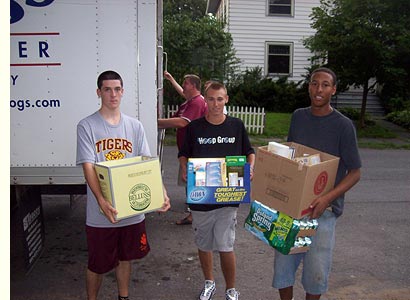 |
 |
||
| Our Soup Kitchen has been temporarily suspended, but all of our other programs are fully operational. Volunteers are still needed to help move equipment and for our other other programs. Please email us for info. |
|||
Hudson Valley Second Harvest
Occasionally, retailers and food service establishments are reluctant to donate food to soup kitchens and emergency meal programs due to liability concerns. While we can understand the initial hesitation in this litigious society, the concern is unnecessary. In 1996 the Bill Emerson Good Samaritan Act was passed to encourage donation of food and grocery products to non-profit organizations for distribution to needy individuals. This law:
Call The Queens Galley to arrange pick-up details or to establish procedures for call-in donations. Once it has been determined that food at your facility will be donated to our recovery program, the following steps should be taken:
Please see our Food Donations Guidelines for additional information. After your donation is picked up you will receive a receipt indicating the type of product and its weight. This information should be passed on to your accountant, as there may be tax deductions/credits available to you based on your company's legal structure and geography. |
| © 2012, A Net Prophet Website Hosting and logo design courtesy of Woollybear |
 Hudson Valley Second Harvest food rescue connects with food service operations (grocers, restaurants, banquet halls, food producers, schools) to utilize wholesome food that may otherwise be wasted. This program is crucial to the success of The Queens Galley Soup Kitchen providing the majority of the food we're able to use.
Hudson Valley Second Harvest food rescue connects with food service operations (grocers, restaurants, banquet halls, food producers, schools) to utilize wholesome food that may otherwise be wasted. This program is crucial to the success of The Queens Galley Soup Kitchen providing the majority of the food we're able to use.